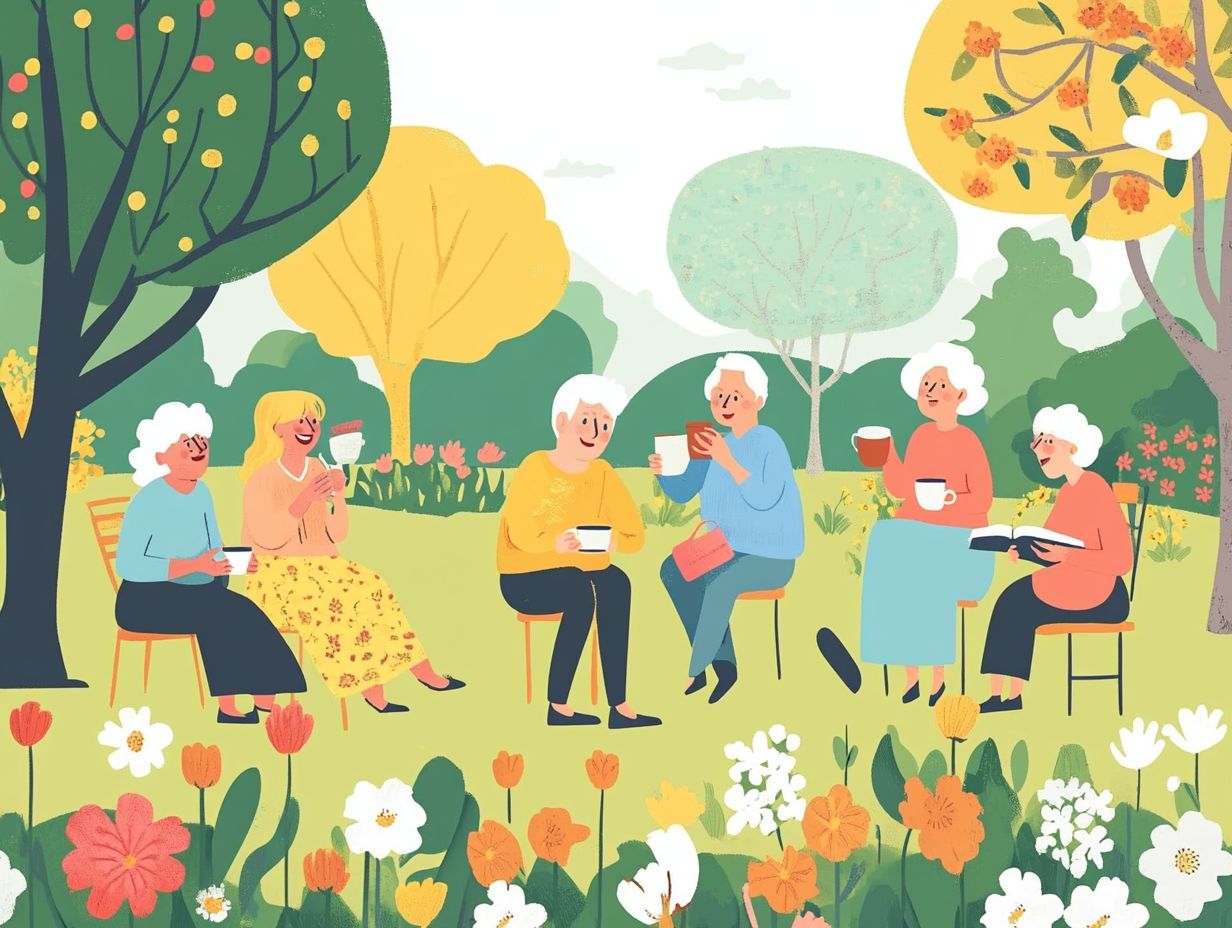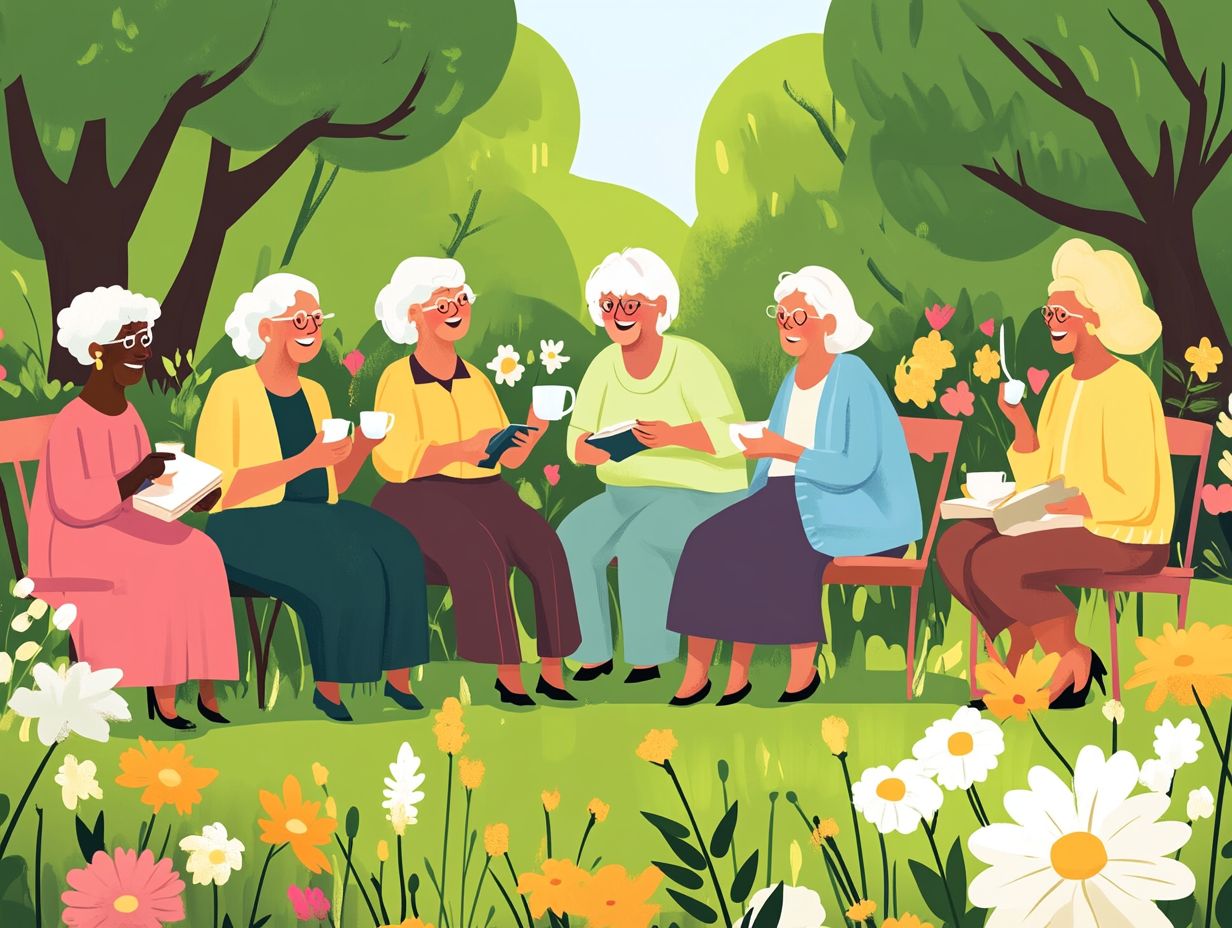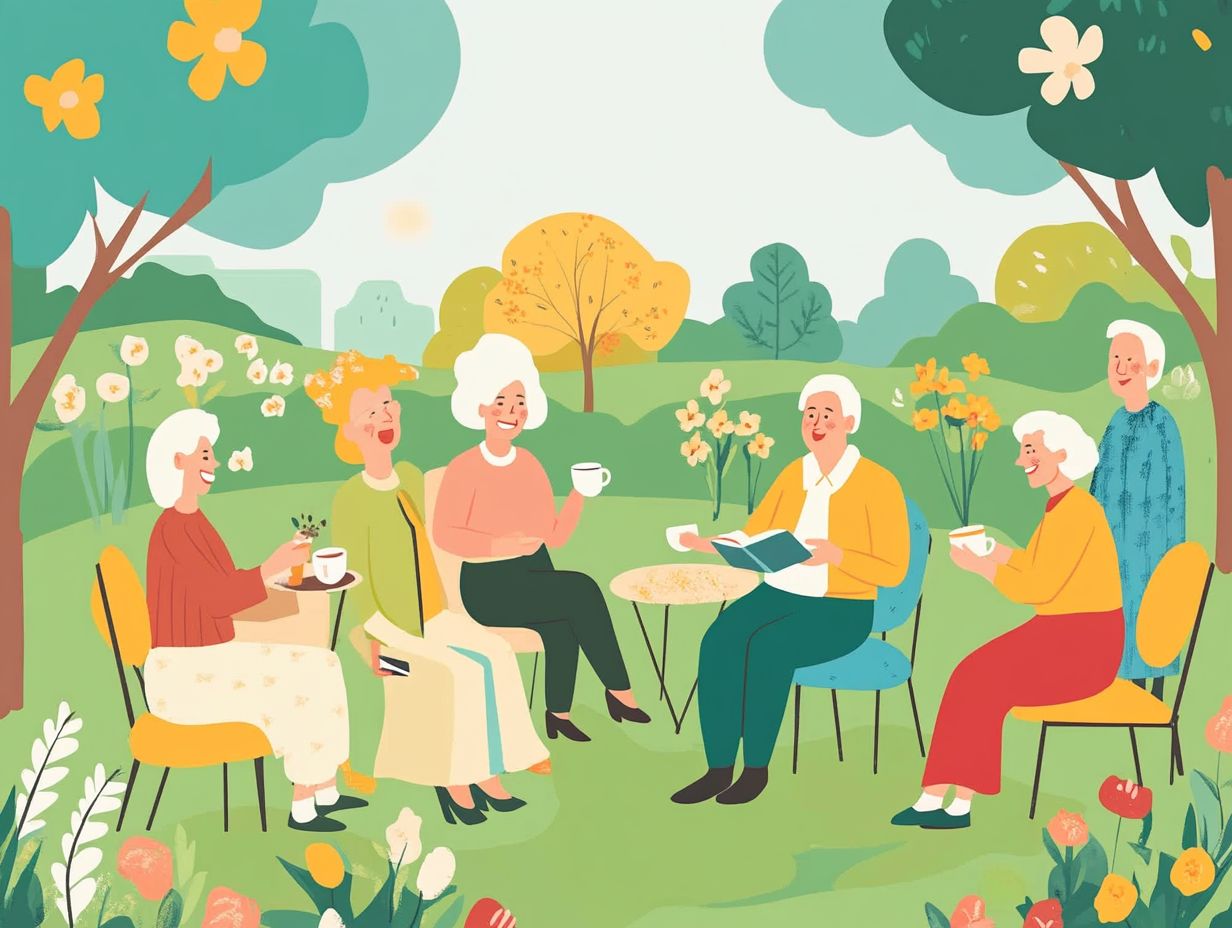The Benefits of Positive Thinking for Seniors
Positive thinking is far more than a mere buzzword; it s a potent tool for those in their golden years seeking to enhance their overall well-being.
This article delves into the essence of positive thinking and its remarkable ability to transform both mental and physical health during the later stages of life. You ll explore effective techniques for cultivating a positive mindset, address common challenges, and uncover practical methods to weave positivity into your everyday routine.
Embark on this journey to discover how embracing optimism can pave the way for a happier, healthier life in your senior years.
Contents
- Key Takeaways:
- Understanding Positive Thinking
- The Importance of Positive Thinking for Seniors
- Practicing Positive Thinking
- Challenges to Positive Thinking for Seniors
- Incorporating Positive Thinking into Daily Life
- Frequently Asked Questions
- What are the benefits of practicing positive thinking for seniors?
- How can positive thinking improve physical health for seniors?
- Can positive thinking help with mental health issues commonly experienced by seniors?
- How does positive thinking contribute to social connection for seniors?
- Is it ever too late for seniors to start practicing positive thinking?
- Are there any additional benefits of positive thinking for seniors?
Key Takeaways:

- Positive thinking can improve mental and physical health for seniors, leading to increased well-being and overall quality of life.
- Practicing positive thinking can be challenging, but techniques such as reframing negative thoughts and setting achievable goals can help overcome obstacles.
- Incorporating positive thinking into daily life can be done through simple activities such as gratitude exercises, mindfulness, and surrounding oneself with positive people and environments.
Understanding Positive Thinking
Understanding positive thinking means recognizing the profound impact that an optimistic outlook can have on your mental and physical health, especially as you navigate the aging process.
Research from renowned institutions like the Harvard T.H. Chan School of Public Health reveals that maintaining a positive mindset can significantly enhance your emotional well-being, reduce stress, and lead to healthier lifestyle choices.
This is particularly crucial for seniors who encounter unique mental health challenges, such as chronic disease and losing mental sharpness. Keep a gratitude journal or join a community support group. These simple steps can boost your happiness and health!
Defining Positive Thinking and its Effects
Positive thinking involves directing your attention toward the favorable aspects of situations and cultivating an optimistic perspective. This practice has been shown to offer numerous health benefits, particularly for older adults.
Embracing this mindset not only lifts your mood but also sharpens cognitive functions, helping you process information more efficiently and make sounder decisions.
Various studies show that individuals who engage in positive thinking experience lower levels of stress and anxiety, which contributes significantly to feeling good emotionally.
Additionally, those who maintain a positive attitude tend to navigate challenges and setbacks with greater resilience. This positive mindset is key when dealing with chronic diseases, as it encourages adherence to treatment plans and fosters healthier lifestyle choices, ultimately enhancing your quality of life.
The Importance of Positive Thinking for Seniors
Positive thinking is essential for you as a senior, profoundly influencing your ability to age gracefully.
It plays a vital role in enhancing emotional well-being, improving stress management, and elevating your overall quality of life.
Research from the Mayo Clinic reveals that seniors who maintain a positive outlook face a lower risk of chronic diseases and enjoy greater life satisfaction. Cultivating social connections through community support amplifies these advantages, underscoring how crucial a positive mindset is when navigating the challenges of retirement.
Mental and Physical Health Benefits

The benefits of positive thinking on both mental and physical health are truly remarkable. It enhances your thinking skills while significantly reducing the risk of chronic diseases like heart disease and stroke.
Research shows that when you maintain an optimistic outlook, you re more likely to adopt healthier habits, which plays a crucial role in boosting your emotional well-being. Positive thinking can lower levels of cortisol the stress hormone leading to an uplifted mood and reduced anxiety.
A report from the American Psychological Association highlights that those who nurture positive thoughts tend to face fewer health-related challenges, including diabetes and hypertension. Cultivating a positive mindset not only strengthens your emotional resilience but also enhances your thinking abilities, ultimately leading to improved decision-making and problem-solving skills.
Practicing Positive Thinking
Practicing positive thinking involves adopting techniques that foster a more optimistic mindset, enhancing your resilience and emotional stability. Techniques like keeping a gratitude journal, practicing mindfulness, and using positive self-talk can significantly transform your outlook on life.
These strategies are game-changers for seniors, who may face emotional challenges as they age. Embracing these practices encourages an uplifting perspective that greatly enhances your overall well-being.
Techniques and Strategies for Seniors
Seniors can truly benefit from a variety of techniques and strategies designed to cultivate positive thinking. Consider incorporating mindfulness practices, keeping a gratitude journal, and exploring the role of positive thinking in mental health by joining support groups into your routine.
These approaches nurture a more optimistic outlook and help you develop a deeper sense of connection and fulfillment. Mindfulness practices encourage you to stay present, significantly reducing anxiety and enhancing emotional well-being. Meanwhile, keeping a gratitude journal serves as a powerful reminder of life s positives, shifting your focus from challenges to blessings.
Support groups offer vital spaces for sharing experiences, alleviating feelings of isolation, and fostering a sense of belonging. Engaging in community activities also plays a critical role in building relationships and lifting your spirits, leading to improved mental health and resilience.
Challenges to Positive Thinking for Seniors
Despite the many benefits of a positive mindset, seniors often face considerable challenges. These include intrusive negative thoughts, stress management difficulties, and the emotional weight of retirement-related issues.
Recognizing these obstacles is essential for crafting effective coping strategies that enhance emotional resilience and cultivate a more optimistic perspective on life.
Addressing Negative Thoughts and Obstacles

Addressing negative thoughts and overcoming obstacles to positive thinking requires effective coping strategies that enhance your emotional resilience and foster supportive community environments.
One powerful approach is to use cognitive behavioral methods, which help you identify and challenge distorted thinking patterns. This allows you to replace negativity with more balanced perspectives. Building emotional resilience can greatly ease the challenges that come with retirement, such as feelings of isolation or a loss of purpose.
By cultivating a strong support network whether through friends, family, or community organizations you can share your experiences and find encouragement during difficult transitions. Engaging in group activities or seeking professional guidance can also nurture a sense of belonging, crucial for maintaining your mental well-being in this new chapter of life.
Start your journey to a happier mindset today!
Incorporating Positive Thinking into Daily Life
Incorporating positive thinking into your daily life can significantly enhance your overall well-being. By establishing healthy habits and engaging in mindfulness practices, you promote being kind to yourself and resilience.
Even simple adjustments to your routines, like participating in uplifting activities and practicing positive statements you say to yourself to encourage a good mindset, can help cultivate a more optimistic outlook and sustain a mindset rooted in positivity.
Ways to Cultivate a Positive Mindset
Cultivating a positive mindset requires you to adopt daily habits and engage in mindfulness practices that reinforce being kind to yourself and promote emotional well-being.
For instance, starting your day with just a few minutes of meditation can help you center your thoughts, clear away mental clutter, and set a positive tone for what lies ahead.
Engaging in community support activities like volunteering or joining a local group fosters a sense of belonging and connection, which can significantly boost your mood and outlook.
Utilizing methods to talk to yourself positively, such as replacing negative thoughts with affirmations, enables you to challenge your inner critic and enhance your overall self-esteem.
These small yet impactful actions create a ripple effect, leading to sustained emotional resilience and a deeper sense of happiness. Start your journey to positivity today!
Frequently Asked Questions
What are the benefits of practicing positive thinking for seniors?

- Improved physical and mental health
- Increased social connection
- A better overall quality of life
How can positive thinking improve physical health for seniors?
Studies have shown that the science behind positive thinking and its benefits can lead to a stronger immune system, lower blood pressure, and a reduced risk of cardiovascular disease for seniors.
Can positive thinking help with mental health issues commonly experienced by seniors?
Yes, positive thinking can be a powerful tool in managing mental health issues such as depression and anxiety in seniors. It can help reduce symptoms and improve overall well-being.
Positive thinking can lead to a more optimistic and open mindset, making it easier for seniors to connect with others and form meaningful relationships. To explore more about this, consider the benefits of a positive mindset, which can also improve communication and social skills.
Is it ever too late for seniors to start practicing positive thinking?
No, it is never too late to start incorporating positive thinking into one’s daily life. Seniors can benefit at any age from adopting a more positive mindset and attitude.
Are there any additional benefits of positive thinking for seniors?
Positive thinking helps seniors maintain a sense of purpose and meaning in their lives, improve cognitive function, and increase resilience in coping with challenges and changes, showcasing the benefits of a positive thinking attitude.
Don’t wait to feel better start embracing positivity today!






